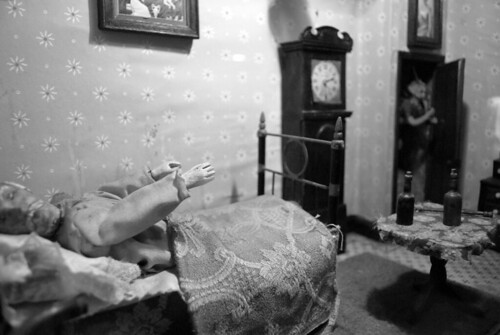
{Photo by rocketlass.}
The lovely 70-plus-degreeness of the day, as unseasonal in its own way as the snow that fell two weeks ago, has reduced my brain to a froth, incapable of putting together a proper post. Instead, I offer some unconnected quotes from recent reading, in hopes of distracting you until such time as my brains have become accustomed to the absence of cold.
1 First, from Jill Lepore's look at the strange history of marriage advice, "Fixed," in the March 29th issue of the New Yorker:
History is hereditary only in this way: we, all of us, inherit everything, and then we choose what to cherish, what to disavow, and what to do next, which is why it's worth trying to know where things come from.That's as succinct and convincing an argument for history as I've ever encountered. It could serve as a epigraph, for example, to the series of podcasts on the American Civil War by David Blight that I just finished listening to (and, as I've said before, highly recommend). It's particularly well suited to that war because the lessons we've drawn from it and the disavowals we've made have been very different in the North and the South since almost the moment the fighting stopped. And thus the path forward has never been quite so clear as we might wish it to be.
2 In the wonderful piece on Jonathan Swift's poetry that he wrote for me at the Quarterly Conversation, Patrick Kurp quoted from the introduction to Victoria Glendinning's 1998 biography of Swift:
He is extremely “nice” in the eighteenth-century sense. He is not always “nice” in our sense of lovable and pleasant. He is a disturbing person. He provokes admiration and fear and pity. All I can assure you is that in keeping company with Jonathan Swift you are not wasting your time.Could there be a better way to introduce a subject--and a biographer--than such a clear-eyed appraisal? It offers instant assurance that your companion on this trip will be perceptive and truthful, and that, in addition, she can write. As someone whose natural tendency is to string clause upon clause, giving a sentence its leash until it pulls up, panting and confused, of its own worn-out accord, I admire the blunt punch of Glendinning's style, both in that passage and throughout the biography.
And if you've not read Patrick's article, you definitely should do so: it's smart and funny and, because it's about Swift, beastly and foul as well.
3 Finally, in honor of the weather that's so addled me, I return to the new New York Review of Books edition of Thoreau's journals, a book that belongs on every bedside. March 31, 1852 found Thoreau less lucky than we Chicagoans: it was "a cold, raw day with alternating hail-like snow and rain." But his mind roved on to spring nonetheless:
Perchance as we grow old we cease to spring with the spring, and we are indifferent to the succession of years, and they go by without epoch as months. Woe be to us when we cease to form new resolutions on the opening of a new year!Thoreau had sins, no doubt, and awkwardnesses and failings, as we all do, but indifference, like inattention, was never of their number.
The next day he wrote,
We have had a good solid winter, which has put the previous summer far behind us; intense cold, deep and lasting snow, tense winter sky. It is a good experience to have gone through with.Indeed. And now it's time for baseball.





